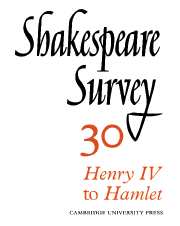Book contents
- Frontmatter
- ‘Henry IV’ and ‘Hamlet’
- Prince Hal and Tragic Style
- The True Prince and the False Thief: Prince Hal and the Shift of Identity
- Falstaff, the Prince, and the Pattern of ‘2 Henry IV’
- Whatever Happened to Prince Hal?: An Essay on ‘Henry V’
- ‘Henry V’ and the Bees’ Commonwealth
- ‘All’s Well that Ends Well’
- ‘Hamlet’ and the Power of Words
- Hamlet the Bonesetter
- ‘Hamlet’: A Time to Die
- Shakespeare, Lyly and Ovid: The Influence of ‘Gallathea’ on ‘A Midsummer Night’s Dream’
- Making a Scene: Language and Gesture in ‘Coriolanus’
- Freedom and Loss in ‘The Tempest’
- Inigo Jones at The Cockpit
- Theory and Practice: Stratford 1976
- The Year's Contributions to Shakespearian Study 1 Critical Studies
- 2 Shakespeare’s Life, Times, and Stage
- 3 Textual Studies
- Index
- Plate Section
Making a Scene: Language and Gesture in ‘Coriolanus’
Published online by Cambridge University Press: 28 March 2007
- Frontmatter
- ‘Henry IV’ and ‘Hamlet’
- Prince Hal and Tragic Style
- The True Prince and the False Thief: Prince Hal and the Shift of Identity
- Falstaff, the Prince, and the Pattern of ‘2 Henry IV’
- Whatever Happened to Prince Hal?: An Essay on ‘Henry V’
- ‘Henry V’ and the Bees’ Commonwealth
- ‘All’s Well that Ends Well’
- ‘Hamlet’ and the Power of Words
- Hamlet the Bonesetter
- ‘Hamlet’: A Time to Die
- Shakespeare, Lyly and Ovid: The Influence of ‘Gallathea’ on ‘A Midsummer Night’s Dream’
- Making a Scene: Language and Gesture in ‘Coriolanus’
- Freedom and Loss in ‘The Tempest’
- Inigo Jones at The Cockpit
- Theory and Practice: Stratford 1976
- The Year's Contributions to Shakespearian Study 1 Critical Studies
- 2 Shakespeare’s Life, Times, and Stage
- 3 Textual Studies
- Index
- Plate Section
Summary
It has often been noticed that North’s Plutarch describes Coriolanus as ‘eloquent’ whereas Shakespeare has often represented him as inarticulate or at a loss for words, and has Menenius remark several times that Coriolanus is not a good speaker. Coriolanus’s critics tend to agree with Menenius’s judgement: ‘Lacking the verbal resources and the confidence in language required for effective argument, he remains taciturn whenever possible . . . [He is] insensitive to the tone or connotative qualities of words . . . there is very little of the lyric in his speech . . . Nor does he engage in word-play’. All of these statements are partially true, or true in certain circumstances, but taken together they are an inadequate description of Coriolanus as a speaker. His peculiarity is not an insensitivity to words; rather, he is uncommonly sensitive to them. For Coriolanus, words have virtually a material existence:
As for my country I have shed my blood,
Not fearing outward force, so shall my lungs
Coin words till their decay
(iii, i, 76–8)and they can register with physical impact upon him:
I have some wounds upon me, and they smart
To hear themselves rememb'red.
(i, ix, 28-9)- Type
- Chapter
- Information
- Shakespeare Survey , pp. 135 - 146Publisher: Cambridge University PressPrint publication year: 1977
- 3
- Cited by

